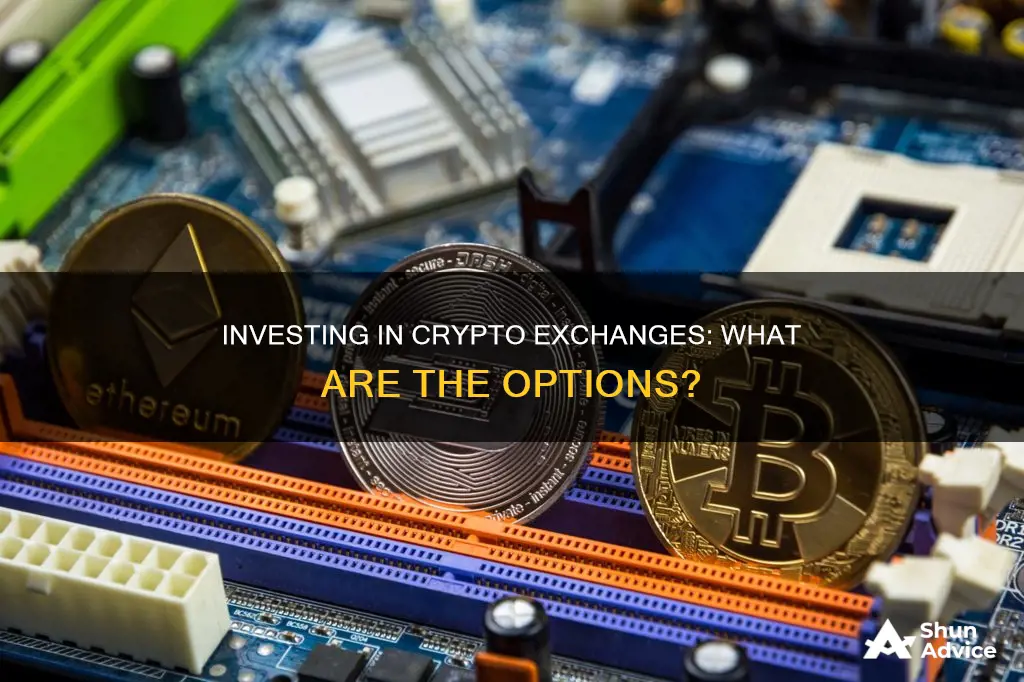
Investing in crypto can be daunting, especially given the complexity of blockchain technology and the hype surrounding it. However, there are several ways to invest in cryptocurrency, ranging from direct purchases to indirect investments in crypto-focused companies and funds.
One of the most common ways to invest in crypto is through a cryptocurrency exchange, such as Coinbase, Binance, or Kraken. These exchanges allow investors to buy and sell various cryptocurrencies, including Bitcoin, Ethereum, and Litecoin. When choosing an exchange, it is important to consider factors such as security, fees, cryptocurrency selection, and customer service. It is also crucial to remember that crypto investing is risky due to the volatility of crypto prices and the potential for regulatory changes. As such, investors should carefully research any digital coin before investing and never invest more money than they can afford to lose.
| Characteristics | Values |
|---|---|
| Number of crypto exchanges | 500 |
| Number of cryptocurrencies | 600+ |
| Types of crypto exchange | Centralized, Decentralized, Hybrid |
| Crypto exchange functions | Provides a match for buyers and sellers |
| Steps to buy your first cryptocurrency via a crypto exchange | 1. Choose a trustworthy exchange; 2. Register and open an account; 3. Fund your account or crypto wallet; 4. Select the cryptocurrency and amount; 5. Initiate and complete a transaction; 6. Verify the transaction |
| Pros of crypto exchanges | Easy and hassle-free for users to buy cryptocurrencies; Exchanges allow users to place a legitimate trade on cryptocurrencies; Many exchanges offer tax forms, making it easier to compute crypto taxes |
| Cons of crypto exchanges | Vulnerable to hacks and cyber theft; If the exchanges go bankrupt, users will not be able to access their funds or place trades; In most exchanges, users do not have the right to hold their private keys |
| Crypto exchange fees | Trading fees, withdrawal fees |
| Crypto exchange selection factors | Pairs and fees, withdrawal and deposit options, security features, reputation and past records |
What You'll Learn

How to choose a crypto exchange
Crypto exchanges are online platforms that allow users to buy and sell cryptocurrencies. There are hundreds of crypto exchanges available, so it's important to do your research and choose one that suits your needs. Here are some factors to consider when choosing a crypto exchange:
- Authenticity and security: Research the exchange to ensure it is legitimate and secure. Check its reputation and the security protocols it has in place to protect your data and funds.
- Payment options: Different platforms support different payment options, such as bank transfer, PayPal, credit and debit cards, or cryptocurrency. Choose an exchange that accepts your preferred payment method. If you're new to crypto, select a platform that accepts fiat currency to make the process less stressful.
- Supported coins and tokens: While most exchanges support Bitcoin and Ethereum, there are thousands of other cryptocurrencies. Choose an exchange that offers the coins and tokens you're interested in. Binance, for example, offers a wide range of cryptocurrencies.
- Transaction fees: Understand the fee structure of the exchange, as fees can vary across platforms. Look for transparent fee structures without hidden costs.
- User interface and experience: Choose an exchange with an intuitive interface that makes it easy to trade cryptocurrencies. Also, consider the customer service and other customer-related functionalities offered by the exchange.
- Regulatory compliance: Check if the exchange is legally allowed to operate in your jurisdiction. Major centralized exchanges like Coinbase and Kraken are heavily regulated.
- Centralized vs. decentralized: Centralized exchanges like Coinbase are regulated and easier to use, but they require you to trust your counterparty. Decentralized exchanges are controlled by users and offer more privacy, but they are often less user-friendly and don't allow trading for fiat currencies.
- Educational resources: If you're new to crypto, look for an exchange that offers educational resources and guidance to help you navigate the complex world of cryptocurrencies.
- Volume and liquidity: Verify that the exchange has sufficient trading volume and liquidity in your target coins to ensure you can buy and sell them easily. Low-volume markets can lead to slippage, where you buy at a higher price or sell at a lower price than intended.
Crypto Currency: Smart Investment or Risky Gamble?
You may want to see also

Crypto exchange fees
Trading Fees
Trading fees are typically charged as a percentage of the amount of cryptocurrency bought or sold. Some exchanges differentiate between "maker" and "taker" orders, with maker fees being slightly lower than taker fees. Makers add liquidity to the market by placing orders that are not immediately matched, while takers remove liquidity by trading with existing orders. Maker fees can range from 0-0.2%, while taker fees can go up to 0.5% or higher, depending on the exchange and trading volume. Some exchanges offer a fixed percentage for both makers and takers, while others have a tiered system where fees decrease as trading volume increases.
Withdrawal and Deposit Fees
Crypto exchanges also charge fees for depositing and withdrawing fiat currencies and cryptocurrencies. These fees vary based on the platform, payment method, and currency. Typically, depositing and withdrawing fiat currencies incur higher fees compared to cryptocurrencies. Most exchanges don't charge for cryptocurrency deposits but may charge a flat fee or a percentage of the withdrawn amount for withdrawals.
Other Costs
In addition to trading and withdrawal fees, some crypto exchanges may charge extra for specific services, such as account maintenance, inactivity, margin trading, and special trading features. These fees can vary significantly between exchanges, with centralized exchanges generally charging higher fees than decentralized exchanges due to their higher operational costs.
Factors Influencing Exchange Fees
The cost of trading on a crypto exchange depends on various factors, including the type of exchange (centralized or decentralized), trading volume and frequency, market volatility, user location, and regulatory environment. High-volume traders often benefit from lower fees, as exchanges want to incentivize their continued use of the platform. The type of cryptocurrency being traded can also impact fees, with more volatile coins potentially incurring higher fees. Regulatory compliance requirements can also affect fee structures, with stricter regulations in certain regions resulting in higher fees for users.
Comparing Exchange Fees
When comparing crypto exchange fees, it's important to consider not only the percentage charged per trade but also the additional costs mentioned above. Some exchanges may offer lower trading fees but make up for it with higher withdrawal fees or vice versa. It's also worth noting that having lower fees doesn't necessarily indicate a better exchange, as other factors such as security, customer support, and the range of features provided should also be considered.
Coinbase Company Investment: Registering Your Business Interest
You may want to see also

Centralised vs decentralised exchanges
Centralized vs Decentralized Exchanges
Centralized and decentralized exchanges are platforms that allow users to buy and sell cryptocurrencies. However, there are some key differences between the two.
Centralized Exchanges (CEX)
A centralized cryptocurrency exchange is a digital currency trading platform that is controlled by a central entity that acts as an intermediary between cryptocurrency buyers and sellers. They are the most popular type of exchange among regular users and are the main avenue for buying cryptocurrencies, especially for first-time crypto investors. Examples of centralized exchanges include Binance, Coinbase, and Kraken.
Pros of Centralized Exchanges:
- User-friendly interface and simple platforms.
- An added layer of security and trustworthiness.
- Higher liquidity compared to decentralized exchanges.
- Owned by regulated entities and subject to rigorous regulatory oversight, which appeals to institutional investors and professional traders.
Cons of Centralized Exchanges:
- Highly vulnerable to hacking or cybersecurity threats.
- Charge service fees.
- Controlled by a centralized entity, which can be shut down in theory.
- Users have no control over their crypto wallet keys, leading to a lack of direct access to their assets.
- Security issues and high-profile hacks have resulted in the loss of millions of dollars worth of cryptocurrencies.
Decentralized Exchanges (DEX)
A decentralized exchange is a non-centralized alternative to centralized exchanges, in which no single entity is in charge of the assets. Smart contracts and decentralized apps are used to automate transactions and trades. Examples of decentralized exchanges include Uniswap, PancakeSwap, and dYdX.
Pros of Decentralized Exchanges:
- Completely private and anonymous.
- No need to transfer assets to a third party.
- Fees are redistributed to liquidity providers, not to a centralized entity.
- Users have full custody of their funds and more security and privacy.
- Distributed hosting reduces the risk of cyber attacks.
Cons of Decentralized Exchanges:
- Trading in fiat currency is not permitted.
- Risk of impermanent loss for liquidity providers.
- Liquidity can be thin, making it harder to execute large orders.
- More technical in nature and require a degree of familiarity with blockchain technology.
- Lack of customer support services.
Both centralized and decentralized exchanges have their own advantages and disadvantages. Centralized exchanges are generally more user-friendly and regulated, while decentralized exchanges offer greater privacy, security, and control over funds. When deciding which type of exchange to use, consider factors such as ease of use, control over funds, liquidity needs, and regulatory compliance.
Strategic Bitcoin Investments: How Much to Invest?
You may want to see also

How to buy cryptocurrency
Choose a Broker or Crypto Exchange
First, you need to select a broker or a crypto exchange. While both allow you to buy crypto, there are some key differences. A cryptocurrency exchange is a platform where buyers and sellers meet to trade cryptocurrencies. Exchanges often have low fees but more complex interfaces. Some well-known exchanges are Coinbase, Gemini, and Binance.US. Cryptocurrency brokers, on the other hand, offer easy-to-use interfaces that interact with exchanges for you. Some popular brokers include Robinhood and SoFi.
Create and Verify Your Account
Once you've chosen a platform, you can sign up and open an account. Depending on the platform and the amount you plan to buy, you may need to verify your identity to prevent fraud and meet regulatory requirements. This may include submitting a copy of your driver's license or passport.
Deposit Cash to Invest
To buy crypto, you'll need to fund your account. You can do this by linking your bank account, authorizing a wire transfer, or using a debit or credit card. Be aware that credit card companies process cryptocurrency purchases as cash advances, resulting in higher interest rates and additional fees.
Place Your Cryptocurrency Order
With funds in your account, you're ready to place your first order. There are hundreds of cryptocurrencies to choose from, including well-known names like Bitcoin and Ethereum, as well as lesser-known options. You can purchase fractional shares of cryptocurrency, allowing you to buy a portion of high-priced tokens.
Select a Storage Method
Cryptocurrency exchanges are not backed by protections like the Federal Deposit Insurance Corp. (FDIC), so it's important to choose a secure storage method. You can leave your crypto on the exchange in a "hot wallet," or transfer it to a separate "cold wallet" for more security. Cold wallets are not connected to the internet and are considered the most secure option.
Best Cryptocurrencies to Invest: Most Profitable Options
You may want to see also

Risks of investing in crypto
Volatility
The value of cryptocurrencies is subject to wild swings and is significantly more volatile than more traditional investments like shares and property. This volatility is driven by factors such as news, sentiment, speculation, and market manipulation, which can have a heavy impact on market prices. For example, a single tweet from Elon Musk can send crypto prices up or down.
Security
Cryptocurrency exchanges and wallets are prime targets for hackers, and security breaches are common. If your crypto is stolen, it's unlikely that you will be able to recover it. Additionally, there is a risk of losing your crypto if you lose access to your private keys or if they are acquired by a third party.
Regulatory Risk
The regulatory landscape for cryptocurrencies is complex and inconsistent across different jurisdictions. There is a possibility that certain countries may restrict the right to acquire, own, hold, sell or use digital currencies in the future. The lack of clear regulations also creates uncertainty around tax obligations and record-keeping requirements.
Low Market Adoption
Despite the hype around crypto, market adoption remains low due to various factors such as regulatory concerns, technology shortfalls, public misunderstandings, and the emerging nature of the technology. There is a chance that cryptocurrencies may never be broadly adopted, leading to a complete loss of value.
Complexity
Cryptocurrency markets are complex and unregulated, making it difficult for investors to understand the risks involved. The decentralized nature of crypto also means that there are no official safeguards or insurance in place to protect investors.
Baby Dogecoin: A Good Investment or Just Hype?
You may want to see also
Frequently asked questions
A crypto exchange is a marketplace where you can buy and sell cryptocurrencies like Bitcoin, Ethereum, and Dogecoin. They work a lot like traditional stock and commodities exchanges.
When choosing a crypto exchange, consider factors such as security features, the range of cryptocurrencies offered, fees, withdrawal and deposit options, and customer support.
To open an account, visit the exchange's website or download its app. You will need to provide personal information and verify your identity. Some exchanges may also require you to submit a government-issued ID.
Investing in crypto carries several risks, including fraud, hacks, and significant losses due to price fluctuations and regulatory changes. It's important to carefully research any exchange and cryptocurrency before investing and not invest more than you can afford to lose.







